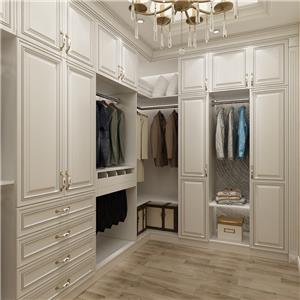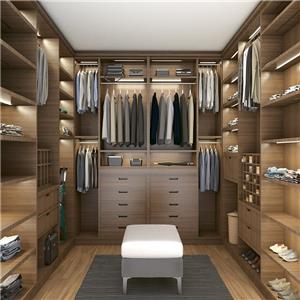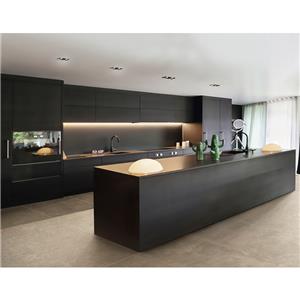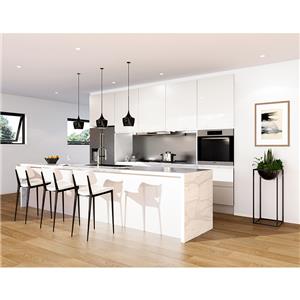Kitchen Cabinet Materials: Total Guide - Hanse
When it comes to kitchen cabinets, there are many options to choose from. Not only do you have to decide on the style of your cabinet, but you also have to determine which material is best suited for your needs. Different materials come with different benefits and drawbacks, so it’s important to understand the pros and cons of each before making a decision.This article will provide a comprehensive guide to the different types of kitchen cabinet materials, so you can make an informed decision about which is best for you.
Pros and cons of acrylic kitchen cabinet
| Pros of acrylic kitchen cabinet |
Cons of acrylic kitchen cabinet |
|---|---|
| Affordable | Can Scratch |
|
Durable |
Can discolor |
| Easy to clean |
Not heat resistant |
| Aesthetically pleasing | Can chip |
| Resistant to moisture |
Not eco-friendly |
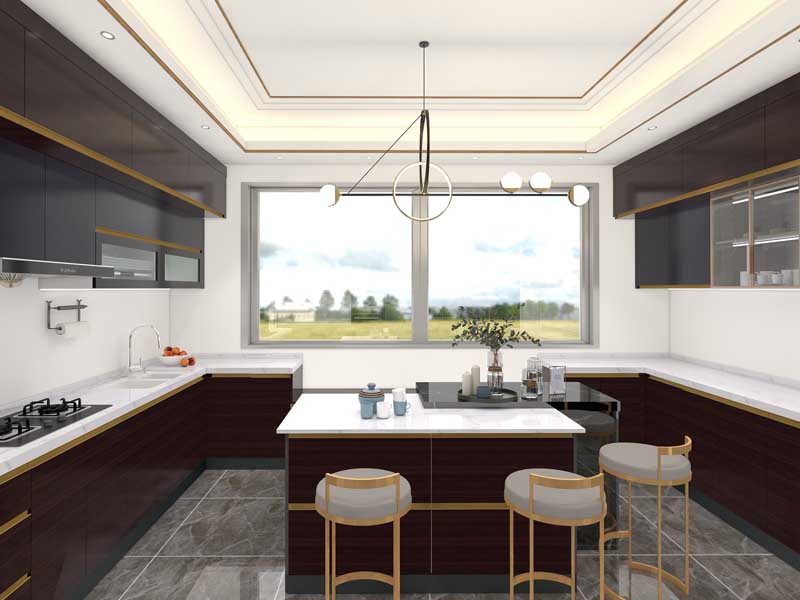
Source: https://www.hansecabinet.com/white-high-gloss-acrylic-finish-kitchen-cabinet
Pros:
Aesthetically pleasing
Acrylic cabinets are known for their glossy, modern look. They come in a wide variety of colors and can be customized to fit any kitchen design. They also don't fade over time, so the color remains vibrant and beautiful for years.
Easy to clean
Acrylic is a non-porous material, which means it doesn't absorb moisture or dirt. This makes it incredibly easy to clean and maintain. All you need is a damp cloth and mild soap to wipe away any spills or stains.
Durable
Acrylic is a strong material that can withstand wear and tear. It doesn't warp or crack like some other materials, and it's resistant to scratches and dents.
Resistant to moisture
Because acrylic is non-porous, it's also resistant to moisture. This makes it an ideal material for kitchen cabinets, which are often exposed to water and humidity.
Affordable
Acrylic cabinets are often less expensive than other materials, such as wood or metal. This makes them a great option for homeowners who want a modern look without breaking the bank.
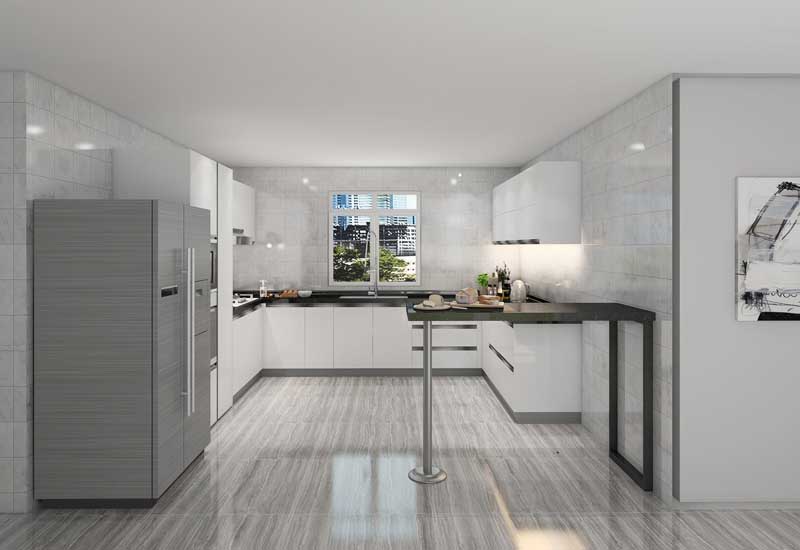
Source: https://www.hansecabinet.com/white-grey-acrylic-kitchen-cabinets
Cons:
Can Scratch
While acrylic is durable, it can scratch if not treated properly. You'll want to avoid using abrasive cleaners or scrubbing the surface too hard. If scratches do occur, they can be difficult to repair.
Can discolor
Acrylic cabinets can discolor over time, especially if exposed to direct sunlight. This can be a problem if your kitchen receives a lot of natural light.
Not heat resistant
Acrylic can melt if exposed to high temperatures. This means you'll want to avoid placing hot pots or pans directly on the surface.
Can chip
While acrylic is durable, it's not indestructible. It can chip if hit with a heavy object or exposed to extreme force.
Not eco-friendly
Acrylic is a type of plastic, which means it's not an environmentally-friendly material. It's not biodegradable, and it can release harmful chemicals when burned.
In conclusion, acrylic kitchen cabinets have many benefits, including their modern look, ease of maintenance, and affordability. However, they do have some drawbacks, such as their susceptibility to scratches and discoloration. If you're considering acrylic cabinets for your kitchen, it's important to weigh the pros and cons carefully and make an informed decision based on your needs and budget.
Pros and cons of solid wood kitchen cabinet
| Pros of solid wood kitchen cabinet |
Cons of solid wood kitchen cabinet |
|---|---|
| Beauty | High cost |
| Durability | Maintenance |
| Versatility | Limited options |
| Resale value | Environmental impact |
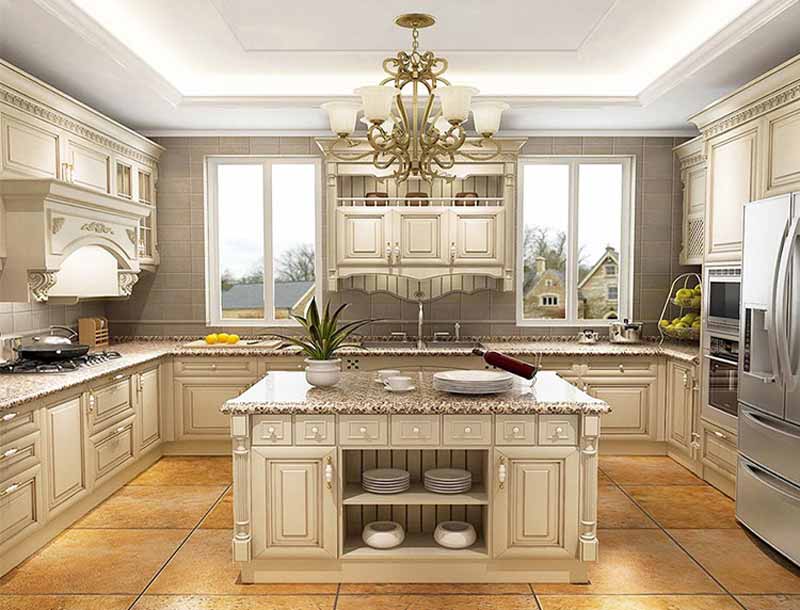
FYI: https://www.hansecabinet.com/luxury-furniture-solid-oak-wood-kitchen-cabinet
Pros:
Durability
Solid wood cabinets are durable and can last for a long time when properly cared for.
Beauty
Solid wood has a natural and timeless beauty that can enhance the overall look of a kitchen.
Versatility
Solid wood cabinets can be stained or painted to match any kitchen design or style.
Resale value
Solid wood cabinets can increase the resale value of a home due to their perceived high quality.
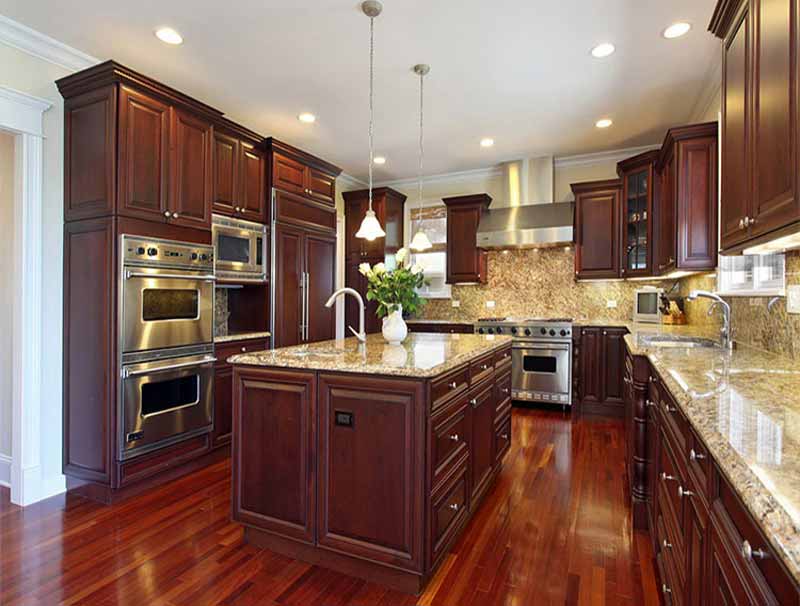
FYI: https://www.hansecabinet.com/customized-red-cherry-solid-wood-kitchen-cabinet
Cons:
Cost
Solid wood cabinets can be expensive, especially if they are made from high-quality woods such as cherry, maple, or oak.
Maintenance
Solid wood cabinets require regular maintenance to prevent damage from water, heat, and humidity.
Limited options
Solid wood cabinets are limited in terms of color and design options compared to other types of cabinets.
Environmental impact
Solid wood cabinets require the use of natural resources and can have a negative impact on the environment.
Overall, solid wood cabinets are a great choice for homeowners who value durability, beauty, and natural appeal. However, they may not be the best option for those who are on a tight budget or looking for a wider range of design options.
Quick look at the pros and cons of laminate cabinet
| Pros of laminate kitchen cabinet |
Cons of laminate kitchen cabinet |
|---|---|
| Affordable | Not heat resistant |
|
Durable |
Limited repair options |
| Easy to clean |
Not as customizable |
| Eco-Friendly | Not as high-end |
| Wide range of colors and patterns |
Not as durable as solid wood |
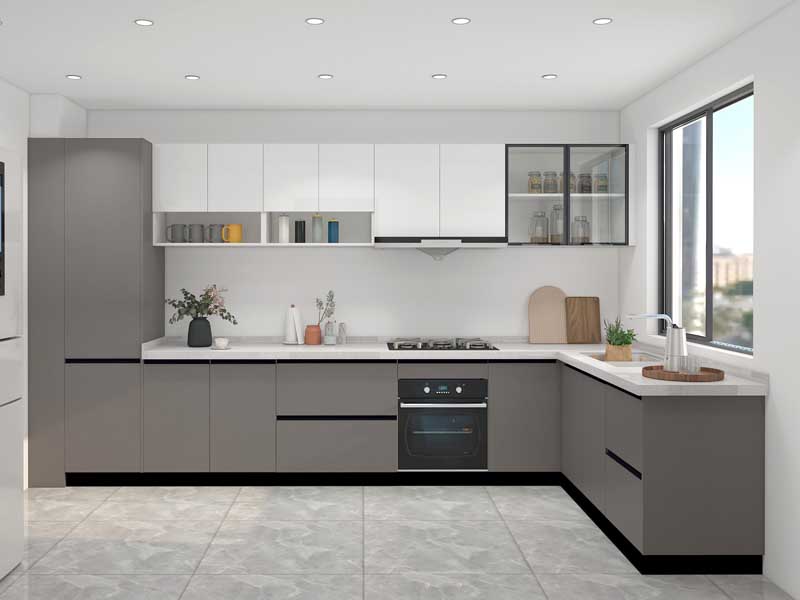
Source: https://www.hansecabinet.com/custom-modern-style--kitchen-cabinet
Pros:
Affordable
One of the biggest advantages of laminate kitchen cabinets is their affordability. They are generally less expensive than solid wood cabinets, which can make them a great option for homeowners on a budget.
Durable
Laminate cabinets are durable and resistant to scratches, stains, and heat. They are also less likely to fade over time, making them a great choice for kitchens that receive a lot of natural light.
Easy to clean
Laminate cabinets are easy to clean and maintain. All you need is a damp cloth and a mild cleaner to wipe away any spills or stains.
Wide range of colors and patterns
Laminate cabinets come in a wide range of colors and patterns, making it easy to find a style that matches your kitchen decor.
Environmentally friendly
Laminate cabinets are made from recycled materials and are considered to be environmentally friendly.
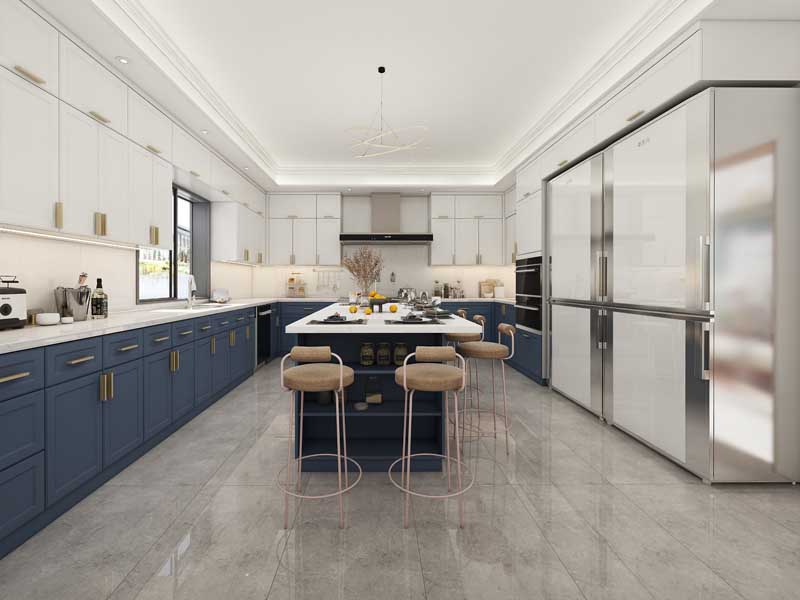
Source: https://www.hansecabinet.com/custom-made-blue-shaker-handle-kitchen-cabinets
Cons:
Not as durable as solid wood
While laminate cabinets are durable, they are not as strong as solid wood cabinets. They can chip or crack if they are hit hard enough, and the edges can peel over time.
Limited repair options
If a laminate cabinet is damaged, it can be difficult to repair. Unlike solid wood, which can be sanded and refinished, laminate cannot be repaired in the same way.
Not as customizable
Laminate cabinets are less customizable than solid wood cabinets. You cannot change the color or finish of laminate cabinets once they are installed, whereas solid wood cabinets can be painted or stained to match your changing tastes.
Not as high-end
Laminate cabinets are not considered to be as high-end as solid wood cabinets. They can detract from the overall value of your home if you are looking to sell in the future.
Not heat resistant
While laminate cabinets are resistant to heat, they are not completely heat-proof. Placing hot pots or pans directly on the surface can cause damage over time.
In conclusion, laminate kitchen cabinets are a great option for homeowners who are looking for an affordable, low-maintenance cabinet solution. While they may not be as durable or customizable as solid wood cabinets, they do offer a wide range of colors and patterns to choose from. Before making your final decision, it's important to weigh the pros and cons and consider your budget, lifestyle, and design preferences.
Pros and cons of aluminum kitchen cabinet
| Pros of aluminum kitchen cabinet |
Cons of aluminum kitchen cabinet |
|---|---|
| Stylish Appearance | High cost |
| Durability | Limited Customization |
| Low Maintenance | Noise |
| Lightweight | Cold Appearance |
| Eco-Friendly | Scratches |
| Anti-rust | |
| Waterproof | |
| Chemical Resistance |
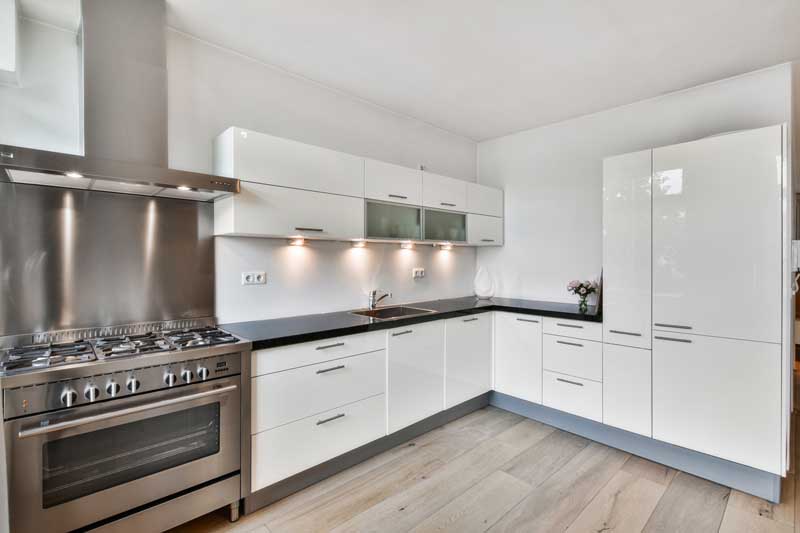
Get a Quote for Aluminum Kitchen Cabinets
Pros of Aluminium Kitchen Cabinets
Durability
Aluminium is a highly durable material that is resistant to corrosion and rust, making it an ideal choice for kitchen cabinets. It is also resistant to moisture and fire, making it a safe option for kitchens.
Low Maintenance
Aluminium cabinets are easy to clean and require minimal maintenance. They are resistant to stains and can be wiped clean with a damp cloth.
Stylish Appearance
Aluminium cabinets have a sleek and modern appearance that can complement a wide range of kitchen styles. They are available in a variety of finishes, including brushed, polished, and powder-coated, allowing homeowners to choose a look that matches their aesthetic preferences.
Lightweight
Aluminium is a lightweight material, making it easier to install and handle than traditional wood cabinets. This can be particularly beneficial for homeowners undertaking a kitchen renovation who want to minimize the heavy lifting involved.
Eco-Friendly
Aluminium is a recyclable material, making it an environmentally friendly choice for homeowners who are looking to reduce their carbon footprint. It is also a sustainable material, as it can be repurposed and reused.
Anti-rust
The stabilizing properties of aluminum and its oxidizing treatment help prevent rust in aluminum cabinets. Hanse uses genuine high-quality aluminum and guarantees that your kitchen cabinets are 100% rust-proof.
Waterproof
Moisture is the enemy of any wood-derivative kitchen cabinet as it can cause cabinet components to warp and swell. Eventually, the damaged area becomes soft and cannot withstand heavy use. Aluminum, however, is completely waterproof. Moisture left over from damp cookware will not do any harm to aluminum kitchen cabinets.
Chemical Resistance
Aluminum's surface is surrounded by a thin layer of oxide, which becomes its natural protection against weak chemicals. You don't have to worry about the safety of using aluminum when you prepare meals.
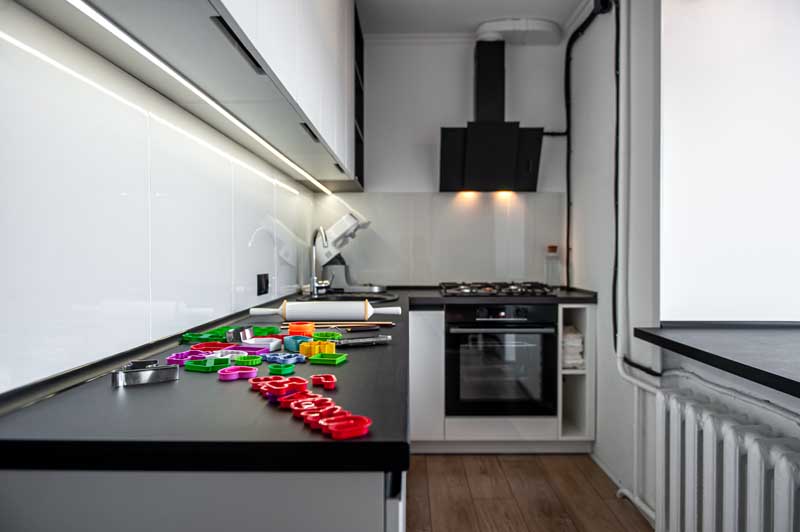
Get a Quote for Aluminum Kitchen Cabinets
Cons of Aluminium Kitchen Cabinets
Cost
Aluminium cabinets can be more expensive than traditional wood cabinets, which can be a significant drawback for homeowners on a budget. However, the long-term durability and low maintenance of aluminum cabinets may offset the initial cost over time.
Limited Customization
While aluminum cabinets are available in a variety of finishes, they are generally less customizable than traditional wood cabinets. Homeowners may find that they have fewer options when it comes to the size, shape, and design of their cabinets.
Noise
Aluminium cabinets can be noisy when opened and closed, which may concern homeowners who prefer a quieter kitchen environment. However, this can be mitigated by using soft-close hinges or dampening materials.
Cold Appearance
While some homeowners may appreciate the modern and sleek appearance of aluminum cabinets, others may find that they have a cold or sterile appearance that does not feel as warm and inviting as traditional wood cabinets.
Scratches
While aluminum is a durable material, it is susceptible to scratching. This can be a concern for homeowners who want their kitchen to look pristine at all times, as scratches can be more visible on aluminum than on wood.
Conclusion
Aluminum kitchen cabinets offer a range of benefits and drawbacks worth considering before making a decision. While they are durable, low maintenance, and stylish, they can also be more expensive and less customizable than traditional wood cabinets. Homeowners should weigh the pros and cons carefully to determine whether aluminum cabinets are the right choice for their kitchen renovation.
Quick look at the pros and cons of particleboard cabinet
| Pros of particleboard kitchen cabinet |
Cons of particleboard kitchen cabinet |
|---|---|
| Cost-effective | Not as Strong as Solid Wood |
| Variety of finishes | Susceptible to Moisture |
| Durable | Not Eco-Friendly |
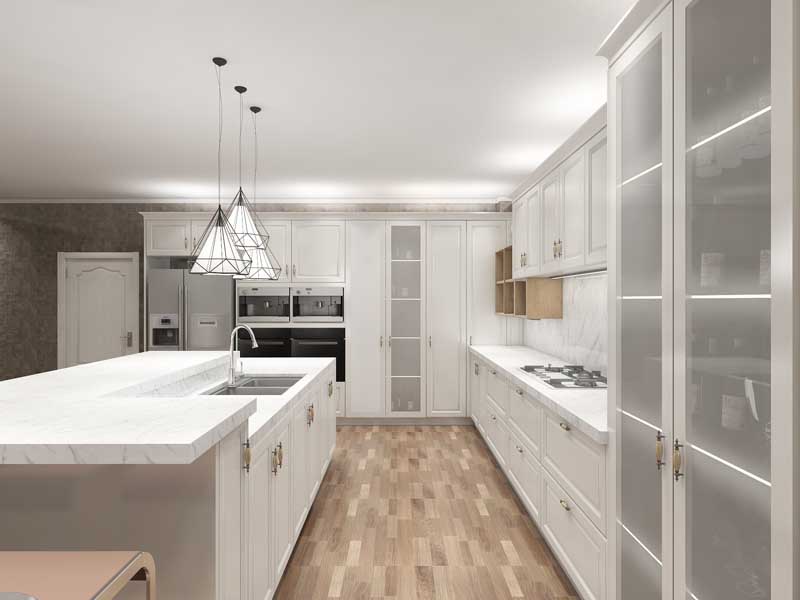
Kitchen cabinet layout for your reference: Modern shaker kitchen cabinet
Pros:
Cost-effective
Particleboard is a manufactured wood product, and as such, it is less expensive than solid wood. This means that particleboard kitchen cabinets are generally more affordable than their solid wood counterparts. This makes them an excellent option for those on a tight budget or for those who are looking to remodel their kitchen without breaking the bank.
Variety of finishes
Particleboard can be finished with a wide range of materials, including veneer, laminate, and paint. This means that you can achieve the look you want for your kitchen cabinets without spending a fortune. Particleboard cabinets are available in a variety of colors and finishes, so you are sure to find one that matches your kitchen decor.
Durable
While particleboard is not as strong as solid wood, it is still a durable material. When properly constructed and finished, particleboard kitchen cabinets can last for many years without showing signs of wear and tear. Additionally, particleboard cabinets are less likely to warp or crack than solid wood cabinets.
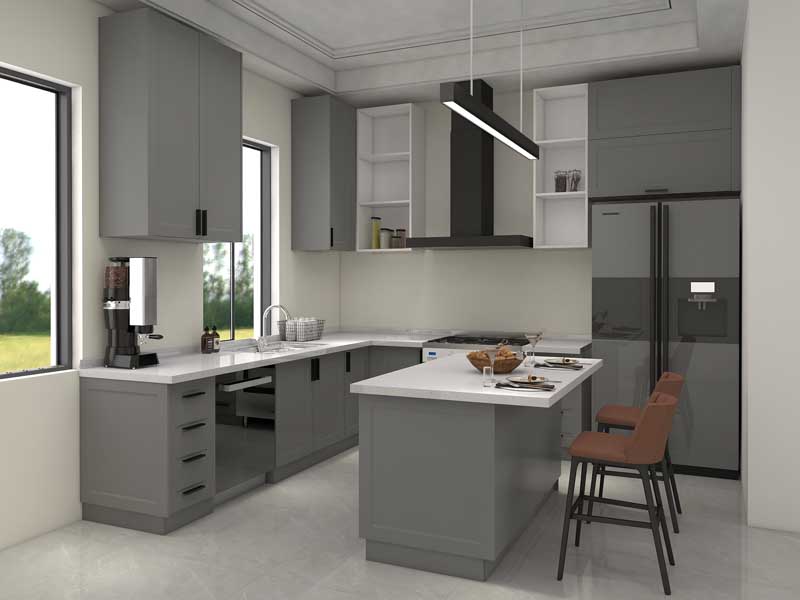
Kitchen cabinet layout for your reference: High gloss kitchen cabinet
Cons:
Not as Strong as Solid Wood
While particleboard is a durable material, it is not as strong as solid wood. This means that it may not be able to support heavy loads or withstand extreme impacts, which can lead to damage or breakage over time.
Susceptible to Moisture
Particleboard is made of wood particles that are bound together with adhesives, which can break down when exposed to moisture. This means that particleboard kitchen cabinets can be susceptible to water damage if they are not properly sealed and finished.
Not Eco-Friendly
Particleboard is made from wood particles that are often sourced from fast-growing trees, such as pine and poplar. This means that the production of particleboard may not be as eco-friendly as other materials, such as solid wood or bamboo, which are sourced from sustainable forests.
Conclusion
Particleboard kitchen cabinets have their pros and cons, and it's up to each homeowner to weigh these factors and decide whether or not they are the right choice for their kitchen. While particleboard may not be as strong or eco-friendly as other materials, it is still a highly versatile and affordable option that can provide a durable and stylish solution for kitchen cabinets. Ultimately, the decision will depend on your personal preferences, budget, and home décor needs.
Pros and cons of MDF kitchen cabinet
| Pros of MDF kitchen cabinet |
Cons of MDF kitchen cabinet |
|---|---|
| Affordability | Not Water-Resistant |
| Durability | Not Heat-Resistant |
| Versatility | Limited Strength |
| Consistent Quality | Cannot be Repaired |
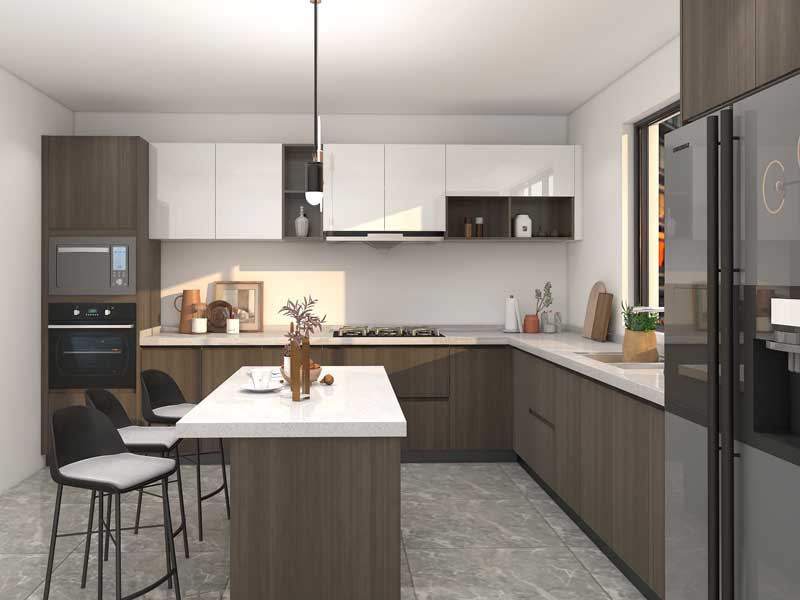
FYI: https://www.hansecabinet.com/modern-kitchen-cabinet-design
Pros of MDF Kitchen Cabinets:
Affordability
MDF is a cost-effective material that is often used in the construction of kitchen cabinets. MDF kitchen cabinets are generally cheaper than solid wood or plywood cabinets. This makes them an excellent choice for homeowners who are on a tight budget.
Versatility
MDF is a versatile material that can be cut and shaped into any size or shape. This means that MDF kitchen cabinets can be customized to fit any kitchen space or design. MDF can also be easily painted, stained, or covered with a veneer to give it a different look.
Durability
MDF is a strong and durable material that can withstand daily wear and tear. It is resistant to warping and cracking, which makes it a great choice for kitchen cabinets that are exposed to moisture and heat.
Consistent Quality
MDF is manufactured in a controlled environment which ensures that every piece of MDF is of the same quality. This means that MDF kitchen cabinets will have a consistent look and feel throughout.
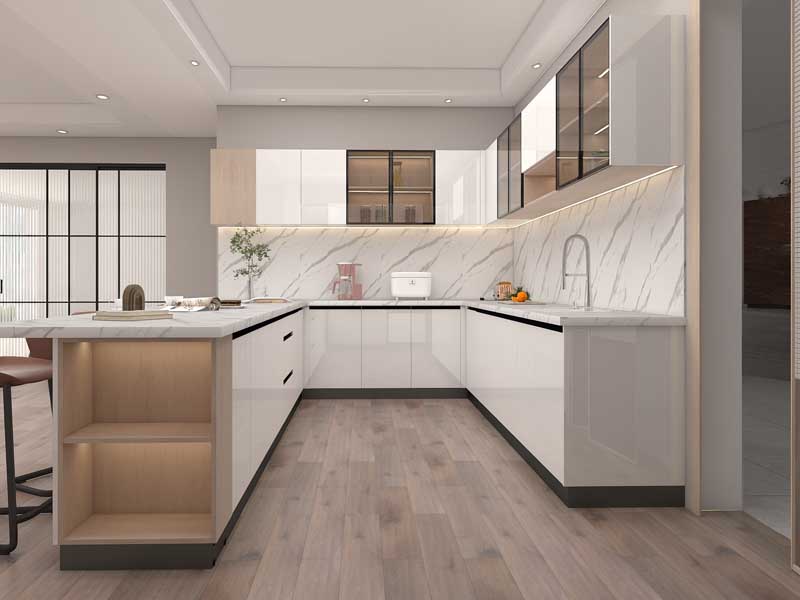
FYI: https://www.hansecabinet.com/modern-grey-high-gloss-kitchen-cabinets-design
Cons of MDF Kitchen Cabinets:
Not Water-Resistant
MDF is not water-resistant, which means that it can swell and warp if exposed to water for a prolonged period. This makes it less suitable for use in areas of the kitchen that are prone to moisture.
Not Heat-Resistant
MDF is not heat-resistant, which means that it can easily be damaged if it comes into contact with hot objects. This makes it less suitable for use in areas of the kitchen that are prone to heat.
Limited Strength
While MDF is a strong and durable material, it is not as strong as solid wood or plywood. This means that MDF kitchen cabinets may be unable to support heavy objects or withstand extreme force.
Cannot be Repaired
Unlike solid wood, MDF cannot be repaired if it is damaged. This means that if an MDF kitchen cabinet is scratched or dented, it may need to be replaced rather than repaired.
Conclusion
MDF kitchen cabinets are a popular choice among homeowners due to their affordability, versatility, and durability. While MDF has its own set of pros and cons, it is a great choice for homeowners who are on a tight budget or who want to customize their kitchen cabinets to fit their specific needs. However, MDF may not be suitable for use in areas of the kitchen that are prone to moisture or heat, and it may not be able to support heavy objects or withstand extreme force. Before choosing MDF kitchen cabinets, it is important to weigh the pros and cons and determine if they are the right choice for your specific needs.
Pros and cons of plywood kitchen cabinet
| Pros of plywood kitchen cabinet | Cons of plywood kitchen cabinet |
|---|---|
| Affordability | Appearance |
| Durability | Limited options |
| Versatility | Quality |
| Sustainability | Formaldehyde |
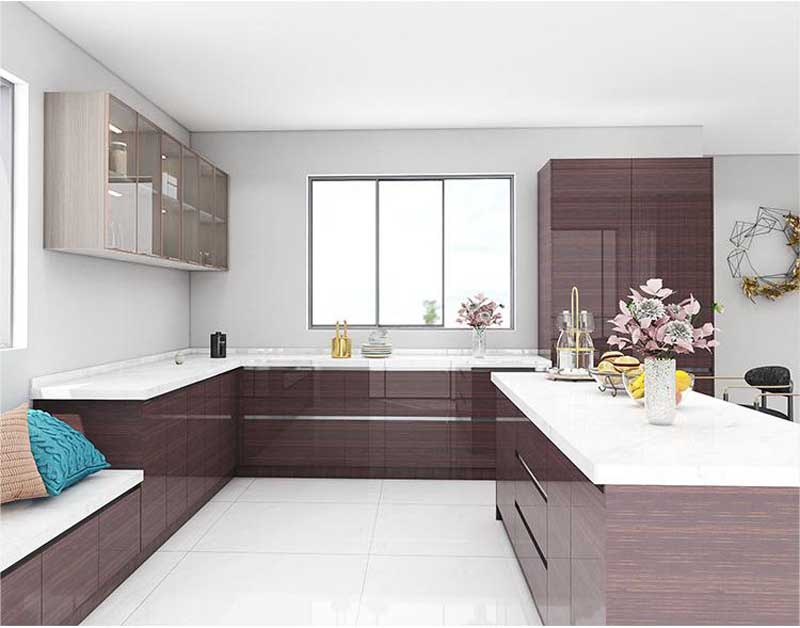
Source: https://www.hansecabinet.com/product/modern-lacquer-kitchen-cabinet
Pros of Plywood Kitchen Cabinets
Affordability
One of the most significant advantages of plywood cabinets is their affordability. Plywood is less expensive than other materials, such as solid wood or particleboard, making it an excellent choice for budget-conscious homeowners. Additionally, plywood cabinets are less expensive to install than custom-built cabinets, which can save homeowners money on labor costs.
Durability
Plywood is a strong and durable material that can withstand a lot of wear and tear. It is less likely to warp or split than solid wood, and it can hold up well under heavy use. Additionally, plywood is resistant to moisture and insects, making it a good choice for kitchen cabinets.
Versatility
Plywood can be stained, painted, or finished in a variety of ways, giving homeowners a lot of design options. It can also be cut and shaped to fit any kitchen layout or design, making it a versatile material for custom-built cabinets.
Sustainability
Plywood is an eco-friendly option for kitchen cabinets because it is made from renewable resources. Many manufacturers use sustainably sourced wood veneers to create their plywood, which can be an attractive option for environmentally conscious homeowners.
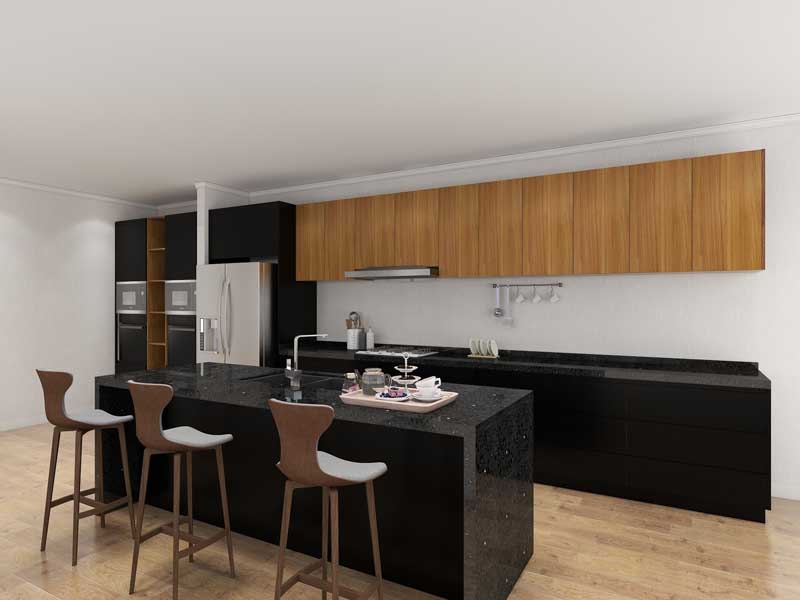
Cons of Plywood Kitchen Cabinets
Appearance
While plywood can be finished to look like solid wood, some homeowners may not like the appearance of the material. It can have a uniform, industrial look that may not fit with a traditional or rustic kitchen design.
Limited options
Plywood cabinets may not offer the same design options as solid wood cabinets. Some manufacturers may have limited colors or styles available, which can make it difficult for homeowners to find the perfect match for their kitchen design.
Quality
The quality of plywood can vary depending on the manufacturer and the type of wood used. Low-quality plywood can be prone to warping, splitting, or delaminating over time, which can lead to costly repairs or replacements.
Formaldehyde
Some types of plywood contain formaldehyde, a chemical that can be harmful to human health. Homeowners should look for plywood that is labeled as formaldehyde-free to avoid any potential health risks.
In conclusion, plywood kitchen cabinets are a popular and affordable choice for homeowners looking to update their kitchens. Plywood offers durability, versatility, and sustainability, but it may not be the best choice for every kitchen design. Homeowners should carefully consider the pros and cons of plywood cabinets before making a final decision. With proper care and maintenance, plywood kitchen cabinets can provide a stylish and functional addition to any kitchen for years to come.
Pros and cons of UV kitchen cabinet:
| Advantages of UV kitchen cabinet | Disadvantages of UV kitchen cabinet |
|---|---|
| High surface smoothness | Poor moisture resistance |
| The paint film is plump | Poor high temperature resistance |
| Environmental protection | Easy to paint off |
| No fading | |
| Scratch resistance | |
| Acid and alkali resistance and corrosion resistance | |
| High surface hardness |
Advantages of UV kitchen cabinets:
1. High surface smoothness: The specular highlight effect is obvious.
2. The paint film is plump: The color is plump.
3. Environmental protection: UV kitchen cabinets not only contain less volatile substances such as benzene, but also form a dense cured film through ultraviolet light curing, reducing the release of substrate gas.
4. No fading: It has been proved by comparative experiments that the UV kitchen cabinet has better physical and chemical properties than traditional kitchen cabinet, which ensures that the UV kitchen cabinet will not fade for a long time, and solves the phenomenon of chromatic aberration.
5. Scratch resistance: The higher the hardness, the brighter it becomes, and it will not deform for a long time at room temperature.
6. Acid and alkali resistance and corrosion resistance.
7. High surface hardness.
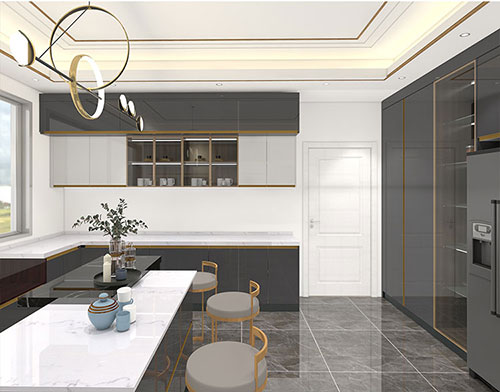
Source: https://www.hansecabinet.com/modern-white-high-gloss-kitchen-cabinet
Disadvantages of UV Kitchen Cabinets:
1. Poor moisture resistance. In the humid environment of the kitchen, good moisture resistance is the most practical. UV kitchen cabinets do not have good moisture resistance, so the service life is shorter than that of other materials.
2. Poor high temperature resistance.
3.Easy to paint off. The surface hardness of UV kitchen cabinets is high, and if they are bumped, the paint will easily fall off.
Pros and cons of stainless steel kitchen cabinet
| Pros of stainless steel kitchen cabinet | Cons of stainless steel kitchen cabinet |
|---|---|
| Durability | Expensive |
| Easy to clean | Fingerprints |
| Stylish | Dents and scratches |
| Eco-friendly | Noisy |
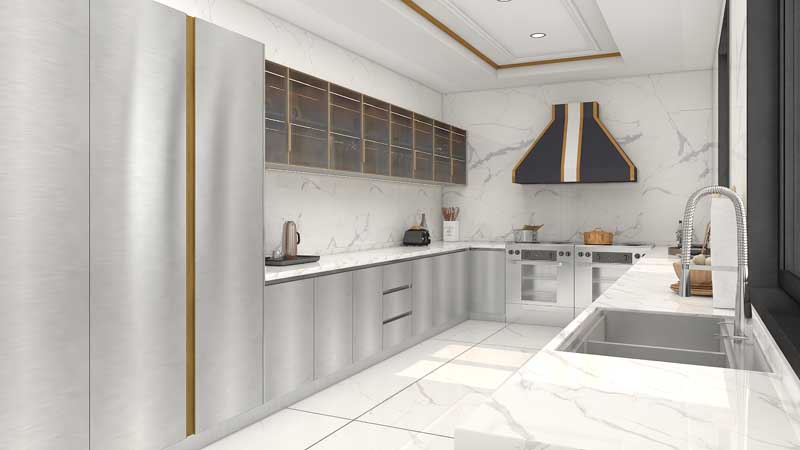
Pros:
Durability
Stainless steel is one of the most durable materials available for kitchen cabinets. It is resistant to scratches, dents, and stains, making it an excellent choice for busy kitchens. It is also resistant to heat and water, which means it will not warp or crack over time.
Easy to clean
Stainless steel is easy to clean and maintain, which is important in a kitchen where spills and messes are common. Simply wipe down the cabinets with a damp cloth to remove any dirt or grime.
Stylish
Stainless steel has a modern and sleek look that is perfect for contemporary kitchens. It pairs well with a variety of materials, including wood, granite, and marble.
Eco-friendly
Stainless steel is a sustainable material that can be recycled at the end of its life. This makes it an eco-friendly choice for homeowners who want to reduce their environmental impact.
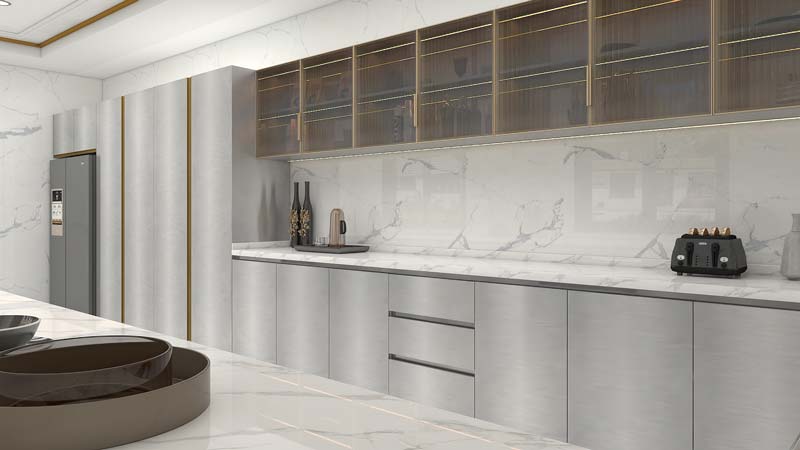
Cons:
Expensive
Stainless steel kitchen cabinets are more expensive than traditional wood cabinets. The cost can be a barrier for some homeowners who are on a tight budget.
Fingerprints
Stainless steel cabinets are prone to showing fingerprints and smudges. This can be frustrating for homeowners who want their kitchens to look clean and polished at all times.
Dents and scratches
While stainless steel is durable, it is not completely immune to dents and scratches. These blemishes can be difficult to remove and may require professional help.
Noisy
Stainless steel cabinets can be noisy when opening and closing. This may be a problem for homeowners who have a kitchen that is open to the rest of the home.
Conclusion
Stainless steel kitchen cabinets offer several advantages over traditional wood cabinets, including durability, easy maintenance, and a modern look. However, they are more expensive and prone to showing fingerprints and smudges. If you are considering stainless steel kitchen cabinets, weigh the pros and cons carefully to determine if they are the right choice for your home.
Pros and cons of melamine kitchen cabinet:
| Pros of melamine kitchen cabinet | Cons of melamine kitchen cabinet |
|---|---|
| Cost-effective | Limited customization |
| Durability | Not heat-resistant |
| Easy maintenance | Less authentic look |
| Versatility | Limited repair options |
| Eco-friendly |
Melamine kitchen cabinetry pros:
-
Cost-effective: One of the biggest advantages of melamine kitchen cabinetry is its cost-effectiveness. Compared to other materials like solid wood or stainless steel, melamine is significantly less expensive.
-
Durability: Melamine is a highly durable material that can withstand everyday wear and tear. It is resistant to scratches, stains, and moisture, making it an excellent choice for kitchens, where spills and messes are common.
-
Easy maintenance: Melamine kitchen cabinets are easy to clean and maintain. They can be wiped down with a damp cloth and mild soap, and stains can be easily removed with a cleaning solution.
-
Versatility: Melamine is available in a wide variety of colors, patterns, and textures, making it a versatile material that can be used to achieve a range of design styles. It can mimic the look of other materials like wood, stone, and metal, without the associated cost.
-
Eco-friendly: Melamine is made from renewable materials, such as wood fibers and resin. It is also recyclable, making it an eco-friendly choice for homeowners who are conscious of environmental impact.
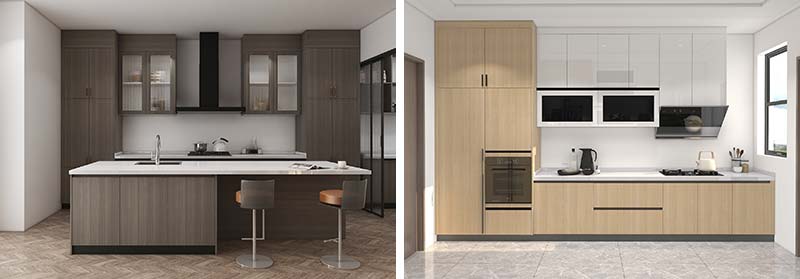
Melamine kitchen cabinetry cons:
-
Limited customization: While melamine is available in a range of colors and patterns, it is not as customizable as other materials like solid wood. It cannot be stained or painted, limiting homeowners' options for customization.
-
Not heat-resistant: Melamine is not heat-resistant, so hot pots and pans should not be placed directly on the surface. This can result in damage to the material, such as warping or discoloration.
-
Less authentic look: While melamine can mimic the look of other materials, it is not as authentic as the real thing. For homeowners who are looking for a natural look and feel, solid wood or stone may be a better choice.
-
Limited repair options: If melamine is damaged, it cannot be repaired in the same way as other materials. In most cases, the damaged section will need to be replaced entirely, which can be costly and time-consuming.
In conclusion, melamine kitchen cabinetry has a lot of advantages, including affordability, durability, and easy maintenance. However, it also has some drawbacks, such as limited customization and the potential for damage from heat. Ultimately, the decision to choose melamine kitchen cabinetry will depend on individual homeowners' preferences and priorities. It is important to weigh the pros and cons carefully before making a decision.
Quick look at the pros and cons of PVC cabinet
| Pros of PVC kitchen cabinet | Cons of PVC kitchen cabinet |
|---|---|
| Water-resistant | Not as durable as other materials |
| Low maintenance | Not eco-friendly |
| Affordable | Limited temperature resistance |
| Versatile | May fade over time |
| Lightweight | |
|
Available in many colors |
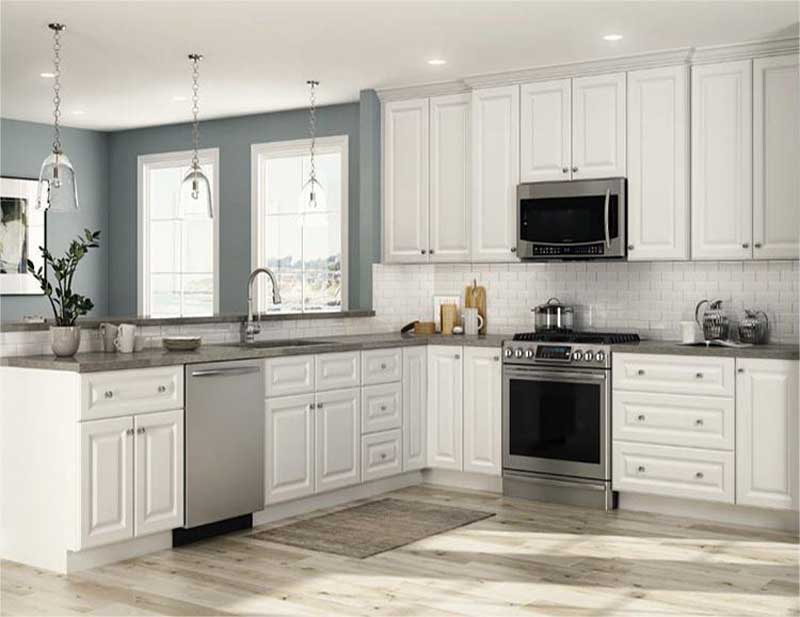
Source: https://www.hansecabinet.com/product/modern-pvc-foam-board-kitchen-cabinets-set-design
Pros:
Water-resistant
One of the biggest advantages of PVC kitchen cabinets is that they are highly resistant to water, moisture, and humidity. This makes them an ideal choice for kitchens, where spills and splashes are common.
Low maintenance
PVC kitchen cabinets require very little maintenance as they are easy to clean and do not require any special treatment. They are also resistant to scratches and stains, which means they will look new for a long time.
Affordable
PVC kitchen cabinets are relatively affordable when compared to other materials such as wood or metal. This makes them a great option for those who want a stylish and functional kitchen without breaking the bank.
Versatile
PVC kitchen cabinets are available in a wide range of colors and styles, which means they can be easily customized to suit your kitchen's design and décor.
Lightweight
PVC is a lightweight material, which makes it easy to install and handle. This is especially important if you plan to install the cabinets yourself.
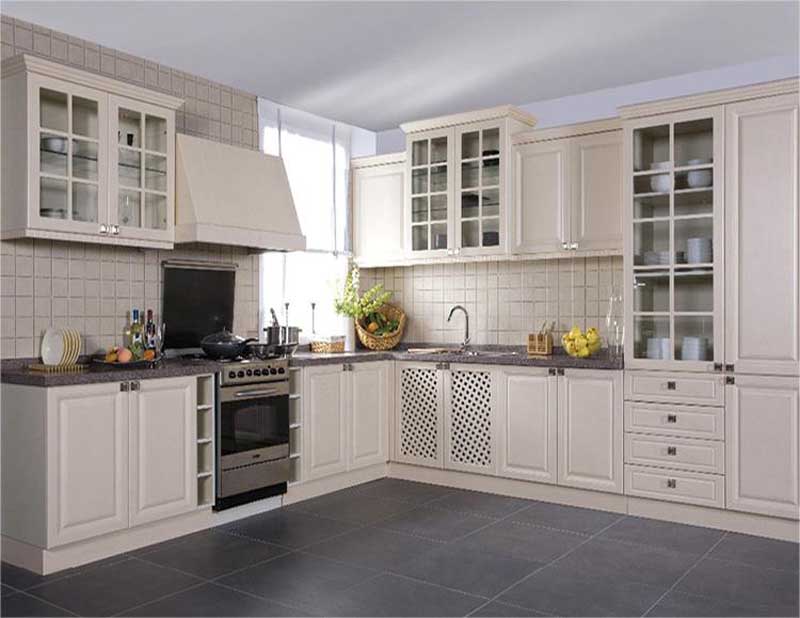
Source: https://www.hansecabinet.com/product/modern-white-pvc-modular-kitchen-cabinet-set-design
Cons:
Not as durable as other materials
PVC kitchen cabinets are not as durable as cabinets made from wood or metal. They can be easily damaged if subjected to heavy impact or weight.
Not eco-friendly
PVC is a type of plastic, which means it is not biodegradable and can be harmful to the environment. This can be a concern for those who are environmentally conscious.
Limited temperature resistance
PVC kitchen cabinets are not suitable for use in high-temperature environments such as near ovens or stovetops. The material can warp or deform if exposed to high heat.
May fade over time
PVC kitchen cabinets can fade over time if exposed to sunlight. This can be a concern for those who want their kitchen to look new for a long time.
Conclusion
PVC kitchen cabinets are a great option for those who want a stylish and functional kitchen at an affordable price. They are water-resistant, low maintenance, and versatile. However, they are not as durable as other materials and can have negative environmental and health impacts. Before making a decision, it's important to weigh the pros and cons and consider your specific needs and preferences.
Pros and cons of thermofoil kitchen cabinet
| Pros of thermofoil kitchen cabinet |
Cons of thermofoil kitchen cabinet |
|---|---|
| Affordable | Prone to peeling |
|
Versatile |
Less durable |
| Easy to clean |
Limited repair options |
| Moisture-resistant | Limited repair options |
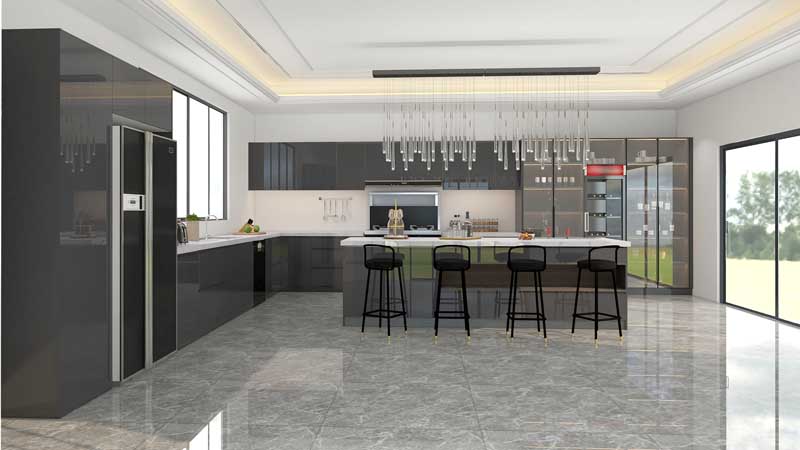
For your reference: https://www.hansecabinet.com/modern-black-high-gloss-kitchen-cabinet
Pros:
Affordable
One of the biggest advantages of thermofoil cabinets is their affordability. Thermofoil is less expensive than other materials, such as solid wood or stainless steel, making it a budget-friendly option for homeowners who want a high-quality cabinet without spending much money.
Easy to clean
Thermofoil cabinets are easy to clean and maintain. They do not require any unique cleaning solutions or techniques, and they can be easily wiped down with a damp cloth.
Moisture-resistant
Thermofoil is a moisture-resistant material, which makes it ideal for use in the kitchen. The laminate material does not absorb moisture, making it less likely to warp or crack over time.
Versatile
Thermofoil is available in a wide range of colors and patterns, making it a versatile option for homeowners who want to customize their kitchen cabinets. The material can also be easily molded into different shapes, allowing for various design options.
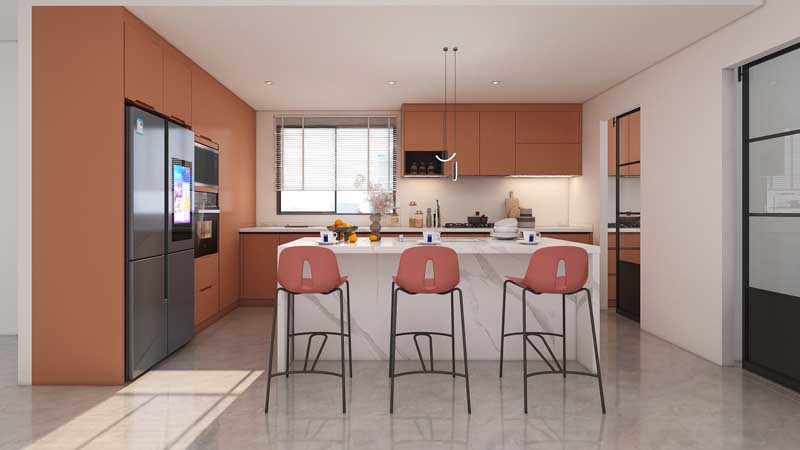
Cons:
Prone to peeling
Thermofoil cabinets are prone to peeling, especially in high-heat or humid environments. Over time, the laminate material can begin to lift away from the surface of the cabinets, exposing the underlying material.
Less durable
While thermofoil is a durable material, it is not as durable as solid wood or stainless steel. Thermofoil cabinets are more susceptible to scratches and dents, and they may not hold up as well over time.
Limited repair options
If a thermofoil cabinet becomes damaged or starts to peel, it can be challenging to repair. The laminate material cannot be sanded or refinished, so the only option may be to replace the entire cabinet.
Environmental concerns
Thermofoil is not a sustainable or eco-friendly material. The manufacturing process requires the use of chemicals, and the material cannot be recycled or easily disposed of.
In conclusion, thermofoil kitchen cabinets are a popular option for homeowners who want an affordable and stylish cabinet. However, they do come with some drawbacks, such as a tendency to peel and a lack of durability compared to other materials. If you are considering thermofoil cabinets for your kitchen, it is important to weigh the pros and cons and consider your specific needs and preferences before making a final decision.
How do I choose the right cabinet material for my kitchen?
Here are some factors to consider when choosing the right cabinet material for your kitchen:
-
Durability: The kitchen is a high-traffic area where cabinets are exposed to moisture, heat, and constant use. Therefore, it is essential to choose a material that can withstand these conditions. Some of the most durable cabinet materials include solid wood, plywood, and medium-density fiberboard (MDF).
-
Style: The material you choose should complement the style of your kitchen. For example, if you have a traditional kitchen, solid wood cabinets with intricate details would be a good choice. However, if you have a modern or contemporary kitchen, sleek and minimalist cabinets made of materials such as glass or metal might be more appropriate.
-
Maintenance: Some cabinet materials require more maintenance than others. For instance, solid wood cabinets need to be oiled regularly to maintain their finish, while MDF cabinets require less upkeep. Consider your lifestyle and how much time and effort you are willing to put into maintaining your cabinets.
-
Cost: Cabinet materials come in a range of prices, so it's important to choose a material that fits your budget. Solid wood cabinets are generally the most expensive, while MDF cabinets are the least expensive. Keep in mind that the cost of installation and hardware should also be factored into your budget.
-
Environmental impact: If sustainability is important to you, consider cabinet materials that are environmentally friendly. Bamboo, reclaimed wood and FSC-certified wood are some options to consider.
-
Color and finish: The color and finish of the cabinet material can have a significant impact on the overall look of your kitchen. Some materials, such as wood, can be stained or painted to achieve a particular color or finish. Other materials, such as metal or glass, are typically available in limited colors and finishes.
By taking the time to weigh these factors and make an informed decision, you can ensure that your kitchen cabinets will not only look great but also function well for years to come.
Kitchen cabinet material FAQs
What material is commonly used for kitchen cabinets?
Kitchen cabinets are usually made from wood, such as birch, maple, oak, cherry, or hickory. Other materials used for kitchen cabinets include laminate, stainless steel, thermofoil, melamine, and wood veneer.
How do I choose the best material for my kitchen cabinets?
When choosing the best material for your kitchen cabinets, consider the look and feel you want, as well as the durability of the material and the cost.
Popular materials include wood, laminate, metal, and thermofoil. Wood is the most common choice, offering a classic look, and is available in a wide range of styles and finishes. Laminate is a budget-friendly option that is easy to clean and can be found in a variety of colors and textures. Metal cabinets are durable and can be found in a variety of styles, from modern to traditional. Thermofoil cabinets are also easy to clean but are usually limited in style and color options.
Consider your style and budget when choosing the best material for your kitchen cabinets.
Related articles
Melamine Kitchen Cabinetry: Pros and Cons
Advantages and disadvantages of UV kitchen cabinets
PVC Sheet Kitchen Cabinets: Advantages and Disadvantages
Stainless Steel Kitchen Cabinet: Pros and Cons
Plywood Kitchen Cabinet: Pros and Cons
MDF Kitchen Cabinet: Pros and Cons
Solid Wood Kitchen Cabinet: Pros and Cons
Particleboard Kitchen Cabinet: Pros and Cons
Aluminum Modern Kitchen Cabinet: Pros and Cons
Laminate Kitchen Cabinet: Pros and Cons
Acrylic Kitchen Cabinet: Pros and Cons
Thermofoil kitchen cabinet: pros and cons

